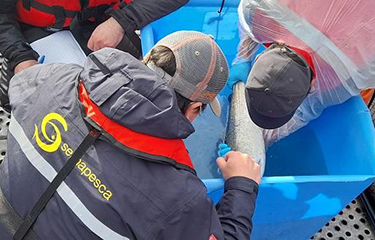Chile’s Sernapesca steps up oversight, sanctions against salmon farmers in Aysén region

During the first half of 2022, Chile’s National Fisheries and Aquaculture Service (Sernapesca) carried out a total of 15 campaigns to monitor aquaculture operations and found breaches in 18 percent of its audits, leading to four subpoenas, 14 summonses to the Superintendence of the Environment (SMA), and 104 citations for minor breaches.
Thus far in 2022, the Puerto Aysén Court of Letters and Guarantee has issued 10 convictions for infringements of Chile's General Fisheries and Aquaculture Law following proceedings initiated by Sernapesca. These rulings may not be appealed, and the offenders must pay the fines ordered by the court, which during the first six months of the year totaled CLP 168 million (USD 184,300, EUR 181,400).
Amid a push from Chile President Garbriel Boric to enforce environmental regulations and growing questions in Chile around the environmental sustainability of the country’s USD 5.2 billion (EUR 5.1 billion) salmon-farming industry, Chile's regulatory authorities have stepped up their scrutiny of salmon-farming operations.
In July 2022, SMA filed a complaint against salmon farmer Marine Farm for overproduction and alteration of the seabed at operations of the salmon grow-out center Isla Partida, located in the Aysén region, operating under the names of Piscicultura Palqui and Granja Marina Tornagaleones. SMA filed four charges against these operations, including two considered minor, one serious, and one grave, according to the environmental regulations. The minor charges are related to farming structures being located outside the company's concession area and deficiencies in its information-sharing processes. The serious charge relates to the company exceeding maximum authorized production levels between June 2018 and April 2019, ranging from 162 to 408 metric tons (MT). The most-serious charge facing Marine Farm is related to alteration of the seabed at the center, which was found to be at anaerobic levels, according to a Sernapesca report filed in December 2018. A subsequent inspection in April 2019 found receipts from a company that employed oxygen to clean the seabed under the farming site. These types of works may only be performed with the explicit authorization of the Undersecretary of Fisheries and Aquaculture (Subpesca), which were not obtained in this instance, it said. Subsequent inspections confirmed that the clean-up work was performed precisely at the eight established points where seabed oxygen conditions were measured.
“If the adulteration of the seabed had taken place and favorable results were obtained in the post-anaerobic sampling carried out … a certain risk of environmental damage would have arisen with the [subsequent] authorization of sowing and operation for the farming center based on information that was not accurate or representative,” SMA said.
Serious and grave infractions can lead to sanctions, such as the revocation of a company's environmental permit, farm closures, and fines – punishments currently facing Nova Austral, which has been accused of overproduction at three grow-out centers in the Alberto de Agostini National Park.
It appears Senapesca will continue its inspections and will sanction those found in violation of Chilean law. In July 2022, Sernapesca also levied fines against Exportadora Los Fiordos for the equivalent of CLP 131 million (USD 143,700, EUR 141,400) for mismanagement of salmon mortality, “a matter of high relevance given its potential to affect the sustainability of regional aquaculture activity,” it said.
The court also condemned salmon farmer Cultivos Yadrán for failing to comply with regulations established in Chile's Specific Health Program for Surveillance and Control of Caligidosis (sea lice, caligus rogercresseyi), ordering it to pay a fine equivalent to pay CLP 29 million (USD 31,800, EUR 31,300) for having provided false information regarding the start date of antiparasitic treatment, on top of a CLP 2.9 million (USD 3,180, EUR 3,130) fine for having performed immersion treatment without prior authorization from Sernapesca.
Sernapesca Aysén Regional Director Cristián Hudson said that sanctioning is the last stage in the oversight process that the different government institutions exercise over aquaculture firms to ensure enforcement of the different rules that govern the sector.
“In this sense, the sanctions now determined by the courts seek to disincentivize the exercise of bad or inadequate practices,” he said. “At the same time, they are key elements to be analyzed by the industry itself in order to generate the necessary improvement strategies to contribute to the sustainability of regional and national aquaculture.”
Photo courtesy of Sernapesca






Share